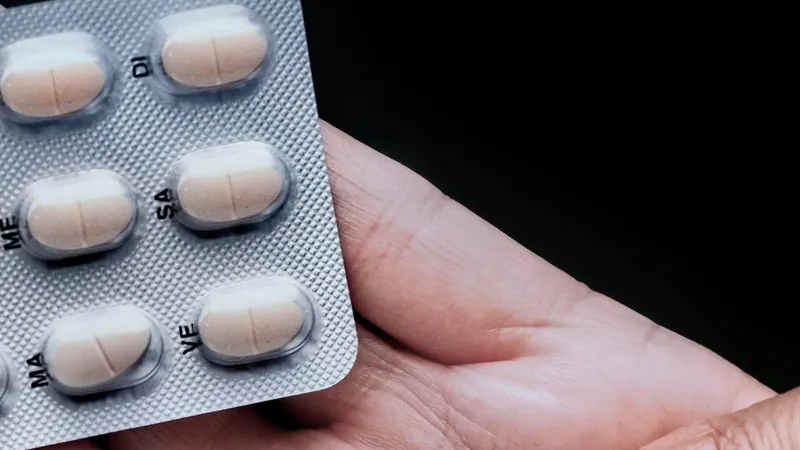
Can Lowering Cholesterol Save Your Life? The Surprising Truth About "Too Low" LDL Levels!
2024-12-20
Author: Wei Ling
Heart disease is an insidious threat that claims a life in the United States every 33 seconds, which makes it the leading cause of death in the country. With an ever-increasing focus on combating high cholesterol levels, specifically low-density lipoprotein (LDL), scientists and medical professionals are grappling with an important question—how low can we go?
As LDL is the primary culprit behind the formation of dangerous arterial plaque, leading to heart attacks and strokes, cardiologists like Erica Spatz from Yale University advocate for reducing cholesterol levels to improve cardiovascular health. “In cardiology, the mantra is simple: the lower, the better,” she states. But is there a point at which lowering LDL levels might pose a health risk?
The good news for individuals at risk of cardiovascular disease is that a plethora of evidence backs cholesterol-lowering medications, including statins and newer drugs, as effective tools in reducing both cholesterol and heart disease risk. According to Donald Lloyd-Jones, a cardiologist at Northwestern University and former president of the American Heart Association (AHA), “We haven’t found a level that’s ‘too low’ yet. I like low. Low is what we’re trying to achieve here.”
The Evolution of Cholesterol Medications
The journey toward controlling LDL began with the approval of the first statin, lovastatin, in 1987. Statins work by blocking a liver enzyme responsible for cholesterol production, significantly lowering the levels of cholesterol circulating in the bloodstream. Nowadays, around 92 million Americans are taking statins, benefitting from a wealth of scientific research demonstrating the drug's ability to lower incidents of heart attacks and strokes.
New therapies have since emerged that are even more powerful than statins. One class of these drugs, known as PCSK9 inhibitors, enables patients to achieve astonishingly low LDL levels—often below 30 mg/dL. In 2022, clinical studies showcased the capability of evolocumab, a PCSK9 inhibitor, to reduce LDL levels by 59% in patients also taking statins, leading to a 20% reduction in adverse cardiovascular events.
Debunking the Myths Surrounding Low Cholesterol
Despite the success of these treatments, some individuals express concerns about low cholesterol levels potentially leading to mental health issues or cognitive decline. However, rigorous research challenges these fears, indicating no substantial evidence linking low cholesterol with depression or memory problems. In fact, lower LDL levels might correlate with better overall cardiovascular health, which in turn could benefit brain function.
A recent American Heart Association statement boldly proclaimed that the available studies do not support the notion that low cholesterol increases the risk for cognitive impairment or dementia. Furthermore, evidence from editorial analyses has shown that naturally low LDL levels, such as those found in newborns, do not signify a health risk.
The Diabetes Dilemma
There may be one caveat worth noting: cholesterol-lowering medications, particularly statins, have been observed to slightly increase diabetes risk in individuals predisposed to the condition. While those with normal blood sugar levels remain at low risk, prediabetic patients may benefit from statins’ heart-protective features despite this potential trade-off.
Guidelines for Cholesterol Management
The AHA recommends that individuals with high LDL levels (above 190 mg/dL) or those diagnosed with cardiovascular conditions or diabetes consider starting statin therapy. High-risk patients should consult their healthcare provider about the most effective treatment strategies, including the potential addition of newer medications.
However, medication alone is not a panacea. Lifestyle interventions, such as regular exercise and improved diet, are essential components in preventing heart disease, with a focus on whole foods over processed items.
The Uncovered Disparities
Alarmingly, a significant number of individuals who could potentially benefit from cholesterol medications remain untreated, particularly among Black and Hispanic populations, low-income individuals, and women. According to Lloyd-Jones, this disparity points to a deeper issue within the healthcare system that requires urgent attention.
In summary, while the conversation surrounding cholesterol levels might seem daunting, burgeoning research and innovative therapies herald a new era in cardiovascular health. Patients can feel more confident than ever in the safety and efficacy of cholesterol-lowering drugs—not only potentially saving lives but also fostering healthier futures. Remember, it is not just about lowering cholesterol; it’s about liberating lives from the clutches of heart disease!



 Brasil (PT)
Brasil (PT)
 Canada (EN)
Canada (EN)
 Chile (ES)
Chile (ES)
 España (ES)
España (ES)
 France (FR)
France (FR)
 Hong Kong (EN)
Hong Kong (EN)
 Italia (IT)
Italia (IT)
 日本 (JA)
日本 (JA)
 Magyarország (HU)
Magyarország (HU)
 Norge (NO)
Norge (NO)
 Polska (PL)
Polska (PL)
 Schweiz (DE)
Schweiz (DE)
 Singapore (EN)
Singapore (EN)
 Sverige (SV)
Sverige (SV)
 Suomi (FI)
Suomi (FI)
 Türkiye (TR)
Türkiye (TR)